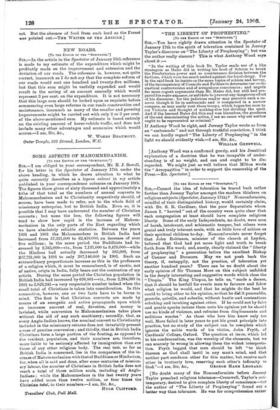"THE LIBERTY OF PROPHESYING."
[TO THE EDITOR OP THE " SPECTATOR."] SIR,—You have rightly drawn attention in the Spectator of January 17th to the spirit of toleration contained in Jeremy Taylor's discourse on "The Liberty of Prophesying"; but was the author really sincere? This is what Anthony Wood says about it :- "In the writing of this book Dr. Taylor made nse of a like stratagem as Hales did in writing his book of Schism to break the Presbyterian power and so countenance division between the factions, which were too much united against the loyal clergy. For in the said book he insists on the same topics of schism and heresy, of the incompetency of Councils and Fathers to determine our eccle- siastical controversies and of scrupulous consciences ; and urgeth far more cogent arguments than Mr. Hales did, but still had pre- pared his a. °Or cpdpi.uucov, or antidote to prevent any dangerous effect of his discourse : for the judicious reader may perceive such a re- serve though it lie in ambuscado and is compacted in a narrow compass, as may easily rout those troops, which began too soon to cry Victoria and thought of nothing else but dividing the spoil. And if the learned Hales did this and was blameless, the goodness of the end denominating the action, I see no cause why our author ought to be represented as criminal."
If Anthony Wood be right, and Jeremy Taylor wrote as from an "ambuscado" and not through truthful conviction, I think we can hardly regard " The Liberty o Prophesying " in the light we should evidently wish.—I am, Sir, &c.,
WILLIAM GRESWELL.
[Anthony Wood was a confirmed gossip, and his Jesuitical explanation of a doctrine that he was incapable of under- standing is of no weight, and can and ought to be dis- regarded. We might just as well believe that Milton wrote the " Areopagitica " in order to support t,he censorship of the Press.—ED. Spectator.]






































 Previous page
Previous page